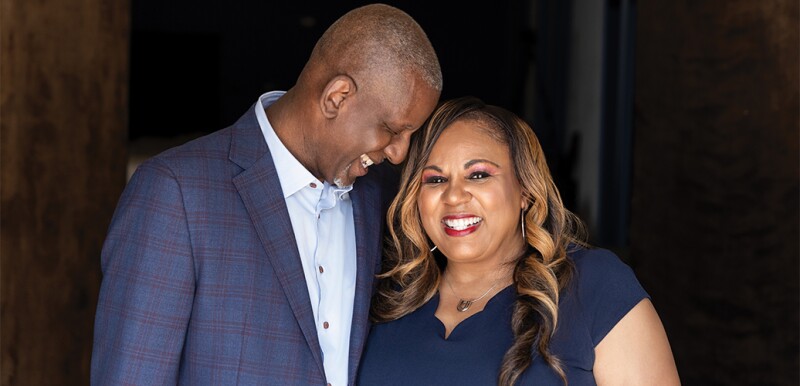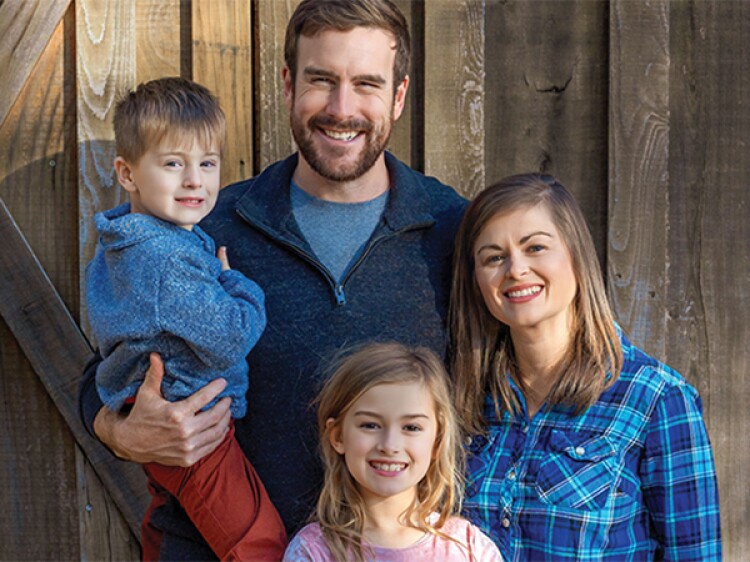Brandon and Kindall Dobson recall a time when they were surviving solely on Brandon’s part-time income of $8.50 an hour. The couple was living paycheck to paycheck, adhering to a strict budget and couponing to save as much as they could.
“I look back and I don’t know how we did it,” says Kindall, 37, who recently worked as an elementary school principal in Wilmington, North Carolina. “We had a lot of family that loved us and helped us, but we had to be pretty strict at the time because we weren’t bringing in that much.”
As they started to make more money, one of the first things they did was purchase a
“We’re not trying to be the richest people on the block. We know that every dollar we have is a gift, and we want to be able to steward that,” says 33-year-old Brandon, who owns a fence company. “I don’t know when we’ll retire, but I don’t want 40, 50 years to go by with nothing in the bank. Plus, we still have to pay off our house and figure out college.”
Charles and Andrea Humphrey, from Los Angeles, are on the other side of that major life milestone: Their 22-year-old daughter Lauryn graduated from college this past spring, with 19-year-old daughter Sydney entering her sophomore year at a dance conservatory this fall. With smart planning, the couple—both pastors and authors—were able to pay for their kids’ education while still saving for retirement.
The Humphreys hope to retire in the next two to three years. With help from their Thrivent financial advisor, they feel prepared to retire with income from real estate and other investments, retirement accounts and pensions, and
Whether it’s
30s: Laying the foundation
With young kids, careers and aging parents, the Dobsons acknowledge this is the busiest season of their lives, one in which
“You have to be super intentional,” adds Kindall, noting that they track expenses to know where every dollar goes and pay off their credit card each month to avoid interest charges. “You can’t be passive with your budget, or your money in general.”
Balancing finances in your 30s can be a challenge because, oftentimes, you have bigger expenses while earning the smallest income you ever will. You still may be paying off student loans, looking to purchase your first home or a bigger home, and starting a family or raising young children, which potentially comes with the expense of child care.
“In your 30s, you’re trying to build,” says Cameron Richardson, an Advice Services consultant at Thrivent. “But if you can be proactive instead of reactive and build your family and life on things that are important to you, that will set you up for success.”
Create a budget around your priorities.
Start saving for retirement.
The
Build your emergency savings.
If you lose your job, the furnace goes out or you experience a medical event, you want to be able to cover expenses. Don’t be overwhelmed by the rule of thumb that states you should have three to six months of expenses covered: Start with $1,000 and build from there. Eventually, you want to get to your “sleep good number,” Beatty says. When it comes to your
Lock in life insurance.
Get as much insurance as you can for as much as you can afford.
40s: A time of transition
As you age into your 40s, you may be done with the days of diapers and day care, but new family-related expenses will make their way into the budget, such as kids’ sports and other extracurricular activities, as well as braces and car insurance for teens. Your 40s are also a time when priorities may shift in your personal and professional life.
“Around 45, when you’ve spent the last 20 years working and you’re looking at the next 20, you start thinking more about retirement and asking, ‘Have I done enough?’” Richardson says. “This is where
Align spending to new priorities.
You may be exploring a different career path that allows for greater
Create a separate travel savings account.
With more mobile kids, “the vacation bug starts going a little crazy,” Beatty says. Allocate a small percentage of every paycheck to a separate
Prepare for college.
Now is the time to talk to your kids about how
Have a conversation with your aging parents.
Your 40s are when you’re likely part of the “

50–60s: A new phase of life
After decades of working and saving, “you’re knocking at the door of retirement” in your 50s, Beatty says. Your focus shifts away from your professional life and onto your personal one: Your kids may be graduating from college and starting families of their own, and your parents could be relying on you more as they age.
This resonates with the Humphreys, who have children attending and graduating college and Charles’s 93-year-old father living with them as Charles and Andrea prepare for retirement. “I want to spend my active, healthy days doing things other than punching a clock from 8 to 5,” says Charles, who also works as an environmental engineer. “I want to be able to do more outreach, local community stuff and do ministry.”
“We’re also major givers,” Andrea says. “We do a lot of mission work. I go to four or five countries a year, speaking and doing leadership development with various organizations or churches that invite me in.”
With more time on your hands, your 50s and 60s are a time when “you start asking questions about what’s really important to you, what you’re passionate about. Maybe you start getting more involved in your church or volunteering,” Richardson says. Also, “your mortality becomes more prevalent. So, you start thinking about your own health and
Make a plan for retirement.
Review your finances to see if you have enough
Think about the legacy you want to leave.
If leaving money to your loved ones or organizations you care about is a priority for you, a financial advisor can walk you through your options, such as
Expect rising health care costs.
Even if you’ve taken good care of yourself throughout your 30s and 40s, you may start to experience more health problems in your 50s and 60s—and there are costs related to that, whether it’s surgery, physical therapy or medication. “Health care is not something that sneaks up on you,” Beatty says. “If you’re real with yourself, you know if you’re healthy or not, so as you plan for retirement, how are you
Shift from child caregiver to parent caregiver.
On top of your own health care needs and costs, you may have some parent responsibilities and expenses depending on how well they planned for the last stage of their life. You may need to make some tough decisions, such as deciding whether to move your mom or dad into your home or into a long-term care facility.
In retirement: Make your savings last
When you stop working and lose a source of income, it can feel like a dramatic shift. “You went to work and got a paycheck from a company where the chief financial officer had to manage where that money came from,” Beatty says. But in retirement, “now you are put in the CFO position of understanding where your money is coming from.” Here are some tips to make sure your retirement savings last:
Have a budget.
In retirement, you may want to allocate more dollars toward leisure activities and hobbies, but you still need to create a
Understand where your money is coming from.
Take inventory of retirement accounts like
Don’t put all your money in one bucket.
Split your funds between monthly income for essential expenses and investments to build more income over time. “Even in retirement, establishing a
Make a tax-efficient withdrawal plan.
Depending on the types of retirement accounts you have, you may need to pay taxes on the money you withdraw in retirement. Talk with a financial advisor about ways to



How Thrivent can help
A







